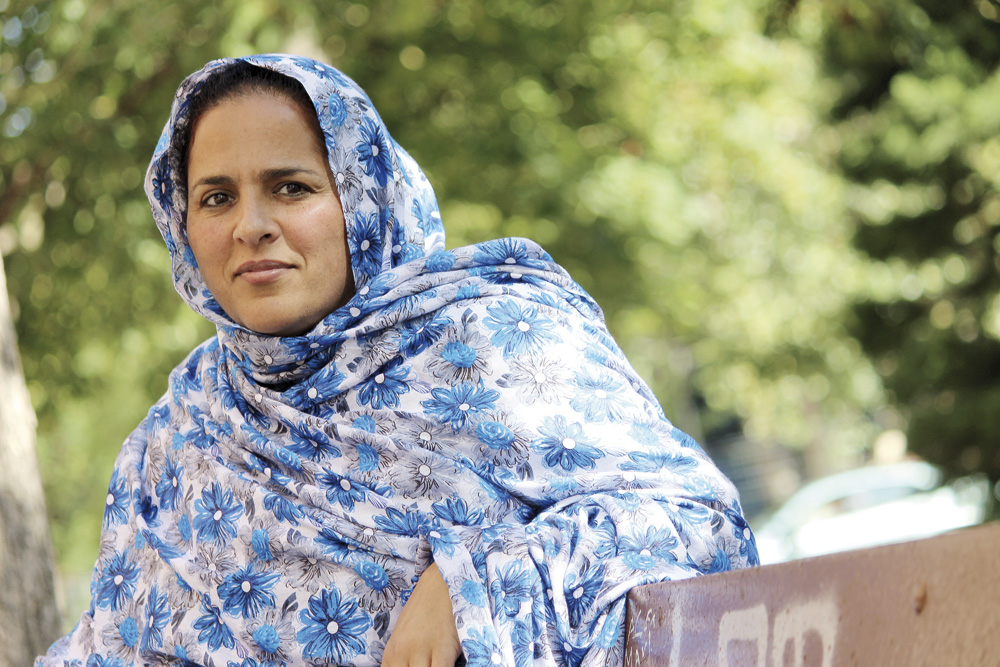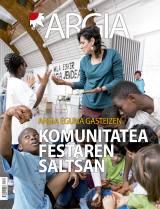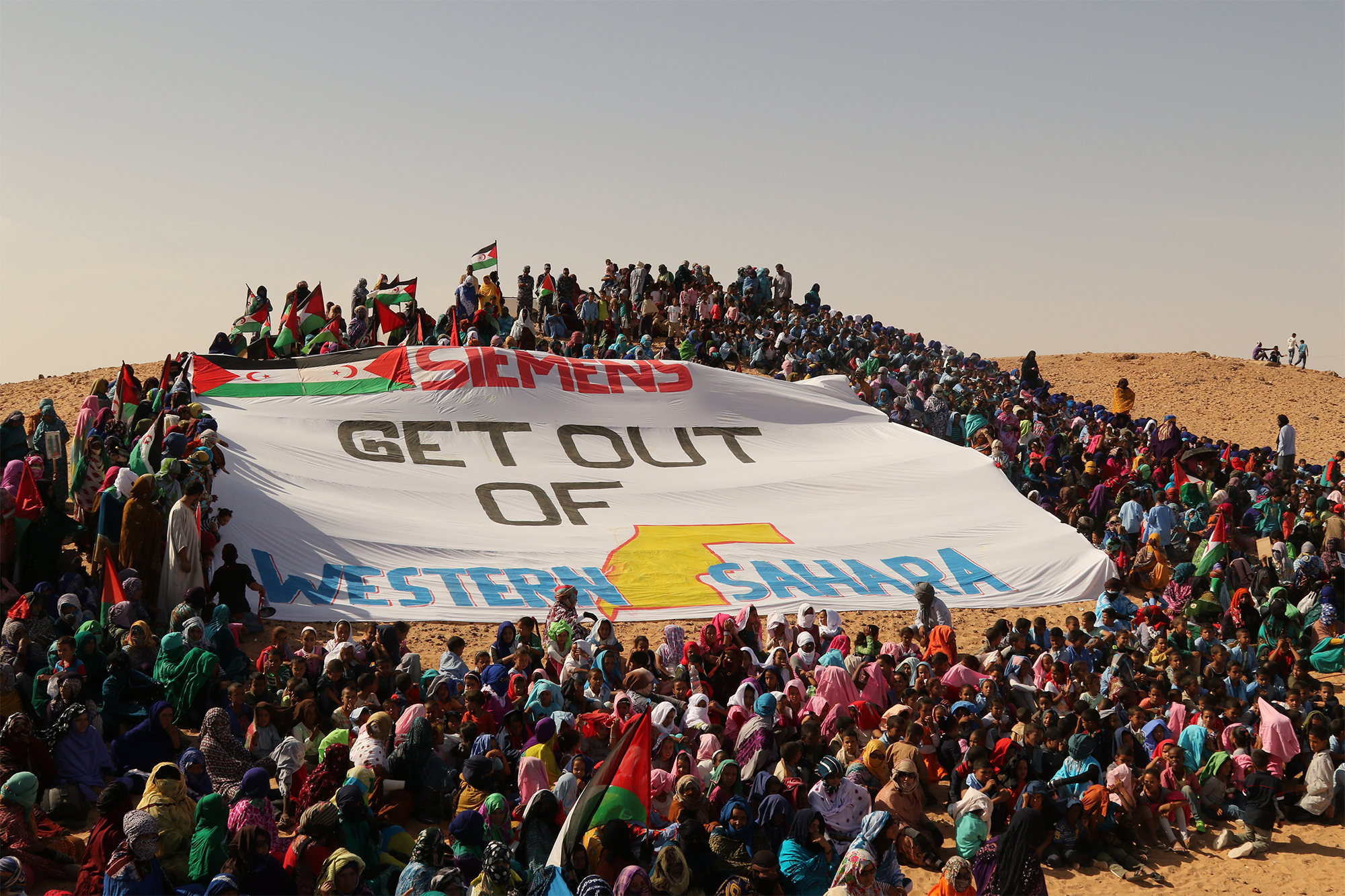"We have to protect cultural values over political views"
- It is Saharawi, born in Western Sahara, in the real Sahara, who has experienced the exodus. Today he is Sahrawi in Vitoria-Gasteiz, mother of the ikastola, totally open to the Euskaldunes, that he himself has put himself in the village, welcoming the Basque and the Basque into his womb.

Saharatik ihesi joan zen familia Safiak 6 urte zituenean. Libian egin zituen Lehen Hezkuntza ikasketak, eta Aljerian Bigarren Hezkuntza eta Batxilergoa. Unibertsitate ikasketak, azkenik, Euskal Herrian. Artean (Bizkaia) bizi izan zen lehenik eta Gasteizen da duela hamar urte baino gehiago. Euskaldunak seme-alabak, bere burua euskalduntzen Safia eta senarra, beren jaioterriko Sahara libre amets.
At the moment I spoke on the telephone to the camps.
Yes. There is nothing more beautiful than the whatsapp. Wonderful. We're Nomad, and I think the mobile phone is the invention that best adapts to our way of being. When I was a student in Bilbao, it was difficult to communicate with the Saharawi family, pure odyssey. You needed by letter, or you needed to make an appointment to call a landline phone at a certain location in Algeria… It was crazy. Now we are rich. Ja, ja…
You are not rich, but you have the ones in your pocket and your in the camps.
We send them the phones. The antennas were placed by the Algerians. This allows us to communicate. However, coverage incidents also occur in the camps. In some places it is better than in others. Nor is it strange that calls are interrupted.
You have been in Euskal Herria for years.
I arrived in November 1990. I studied in Algeria, studied high school and selected a number of students according to their academic reports. At the same time, apparently, the City of Vitoria-Gasteiz awarded three scholarships, and there they sent me, along with two other students. When we arrived, we didn't know a word in Spanish. We started at the Francisco Vitoria Institute, in Adult Continuing Education, also in private schools... June came, we did the selectivity test, but we didn't pass it. That is, the lessons of science outweigh them, while the letters do not. In September, we went back to the exam and passed it.
Once the university entrance test has been passed, what?
I started studying business. Diplomatura. Three years ago, but I needed four. I wasn't used to going into a college room and taking notes all the time. That first year, I got really tough. When I got used to it, it was something else. In the last two years I have approved the subjects with ease.
It's already here.
No, no, it's more complicated. A referendum on the Sahara was promised in 1992 and all the Sahrawi pupils who were abroad returned home. We had to vote.
However, the referendum was not held.
No! But what an illusion! We were very happy, we were told that the referendum was going to be held… and it was so much joy when we heard that the referendum was not going to be held. Everything was ready, and all of a sudden, no, it wasn't a referendum. To begin with, in 1975 they had the right to vote those in the Sahara. Morocco, for its part, also wanted the Moroccans who had since been in Western Sahara to vote. There are many more Moroccans who have lived in our territory since then. It was impossible to hold such a referendum. Furthermore, I am convinced that there were hidden interests for the referendum not to be held and not to be held.
I read that the Sahara is a rich land.
It contains phosphate, one of the world's largest fishing banks. At least, that was the case in other times. Now, as a result of these aggressive fishing techniques that they use each other, I do not know what it will be. Oil surveys have also been carried out. Economic interests are there, of course. The first reason not to liberate Sahara, however, is this evil desire of monarchies to extend the Empire. If the Sahara were simply an inert land, Morocco would not have had an interest in appropriating it.
Without a referendum, you returned to Basque Country.
I went back and started studying in college. In 1998, I graduated in Business Science and went back to the camps. I always dreamed of working there, although I didn't have infrastructure like here, or logistics like here. I went and was there, living with my family and working with the Saharawi Youth, inventing projects with the Spanish Socialist Youth, sometimes in Madrid. However, in the year 2000, I returned to the Basque Country.
What was life in the camps?
Life in camps is a routine, and more routine for women. I, for example, worked in some offices. In addition, I had to take care of my family, rule livestock, make meals… Working, from morning to night. As I did, I wondered: Will I live like that forever? Is this the life that I wish for myself?” Yes, I worked for my country, but I had already known life in this country and the routine that I had acquired there was terribly harsh.

Is life still like this today?
There's nothing. It used to be that way, and now also with work. There's nothing to do. Some young people will work with some NGOs, others will be nurses… But there is no future. Despite the studies, nothing. As for women, the path is much more marked, as society devours it: getting married and making children has nothing else. The man will be able to open his business, a small shop... But there is no state structure.
You were born in the camp routine.
It doesn't believe it. I haven't lived long in the camps. I was born in the real Sahara, and at the age of six, my family left there in 1977. We arrived in the desert and there was nothing. Several countries, including Libya, Cuba and Algeria, were assisted by several children. I, for example, was in Libya at the age of 6, studying. The students came home every two years, for the summer. So we were there until 1984. In that year, Gaddafi made an agreement with Morocco, which was how Gaddafi was, when he was going, and we the students from the Sahara took us out of Libya and took us to Algeria.
You studied at the barnetegi.
Yes. In the barnetegi of Libya we were 85 Saharawi students. Algeria, 50. I do not have many memories of Libya, but I do have memories of Algeria. We understood very well. In Libya, as we were young, we learned in Libyan. Moreover, when we returned to the camp two years ago, some of those of us who had gone with us could not speak in Hasaní, they had forgotten it. We learned Libyan, language closed, language closed. Kar, ha… In Algeria, on the other hand, we adapted our Arabic to the local dialect, and we acted without hindrance both at school and with friends.
You don't have a lot of memories of Libya, but you do have your trip from the Sahara to the camps.
Something. At one point, I could see the adults hesitating, hesitant. My grandfather and my uncle on the one hand, my grandmother on the other… “Give them you, I… We walk, you…”, I was struck that serious people had so much uncertainty. We lived in Aaiun and there remained our grandparents and grandmothers, without camps. When we left, our little brother left us and left home to my parents. Our mother saw them red, the Moroccans were almost there… and, in the end, the brother stayed at his parents’ house. The older brother and the little one stayed there. Now I tell you: “I was lucky!” Ja, ja…
So you were in Aaiun.
Yes, although I was born in Mijek, on the border with Mauritania, we were nomads and we were traveling from one side to the other. Our parents went to Mijek in the late 1960s. They used to be empty nomads. Even though the house was in Aaiun, where it had rained, there they were going to seek food for the cattle, to the water wells… A hard life. My father has been nomad, but he doesn't want anyone.
No nomad, no camp.
The situation must be changed, the policy must be exploited from time to time. Globalization is also against us. Young people deserve something else, the Front has to do something, or someone, or us all.
Just like in Catalonia, maybe.
How in Catalonia? On the eve of the referendum in Catalonia, the unions called for a strike at the secondary schools in Vitoria-Gasteiz. I ordered my son not to strike, outraged at what Puigdemont had told him the other day. They interviewed him on television and asked him: “Are you in favor of the self-determination of peoples?” he says yes. “In 2014 you voted against the independence of Kurdistan.” “I don’t remember,” Puigdemont’s answer. “And the independence of the Sahara?” “I voted no.” Puigdemont! He did not remember that of Kurdistan, but he did say no to the Sahrawi. I told my son: “Today, not the strike.” I am in favour of the self-determination of all peoples, but “you and I do not”, no!
Sahrawi, in Libya, in Algeria and in the Basque Country, we have taught you, quite nomad.
Ha, ha… I am here for the friends I made here. I'm 25 years old and I still have friends. At that time there was no business school in Vitoria, and although we were awarded the scholarship by the city council here, I studied in Bilbao, there lived. It was already my husband, the Sahrawi, and a friend from Bilbao surrounded us the house in Artea, in Arratia. And there we were five years.
You learned so much in Basque.
I don't know whether I learned or not, but at least my ear is tightly tight. Everything, everything! When we came to Vitoria, our oldest son was 4 years old: I knew no more than Biscayan and Hasaní. I didn't know Spanish. But, of course, he had enough months and a half in Vitoria-Gasteiz to start speaking in Spanish as well.
Here we have made you friends in Gasteiz, sons in the ikastola, you have an Abertzale atmosphere, but also Spanish.
I am in favour of respecting all the views, to begin with. But in the face of globalisation, we have to protect cultural values, culture, over and above political views. One must defend one’s own language, one’s own identity. I have a friend who has spoken to me against Euskera. I repudiate him by saying that languages enrich us, that Euskera enriches us, that cultural values enrich us, regardless of whether we have political ideas. In the Basque Country, we have raised our children in a learning environment of both the Basque and the Spanish, but in an environment of initiation. We all have to protect cultural values, even if we like political administration. I can now say that.
What do you mean? Not before?
When we arrived, I had no current view. I have also learned. Coexistence here is delicate. At first, come and, with your friends: “When I came to Spain…” and they: “When did you come to Euskadi?” Then, with another: “When I came to the Basque Country…” and she: “Well, when you came to Spain…” In the end, “When I came here!”, not to Spain, not to Euskal Herria, here!” and it is.
So many years out of the country, where are you from?
I tell my friends that I am Basque Saharawi. I have been here for many years, I have been naturalized, I claim here things that I would not claim in the Sahara. I come from two cultures, here and there, I love going out with my friends, talking, laughing… On the other hand, there are customs of my culture that I don’t understand from today. Respect, don't understand. I am fortunate because I have two cultures, that of here and that of the Sahara, and I would like my children to also have the perspective that these two cultures offer.
“Lehen umea izan baino lehen, hemen bizi nintzelarik ere, hilabeteak ematen nituen kanpamenduetan. Ez bat eta ez bi, hiru eta lau ere bai. Ezagutzen dut hango bizimodua, ikusi ditut berrikitan egin dituzten errepideak, jarria dutela elektrizitatea… Ongi da horiek egitea, baina horrek, bestalde, betikotu egiten du egoera”.
“Ez dakit zein den kanpamenduetako etorkizuna, ez dut esperantza handirik, ikusiak ikusirik. Ez dakit inoiz Aljeriako parte egingo duten inguru hura edo zer egingo duten, baina independentzia… Gainera, kanpamenduak ez dira gure lurra, betiko Sahara, Mendebaldeko Sahara baizik. Kanpamenduak ez dira sahararron etxea”.
“Sahara da gure lurra, baina hara joan eta, orain, marokoarrez inguratuta, ez gara etxean sentitzen. Arrotz gara gure herrian”.
The girl who appears in the center of photography, which can hardly be considered historical, is writing a list of adjectives: I, you, he, we, you, they. Looking down, I couldn't see what his gaze looked like.
Insensitive to the work of the photographer, you, slowly and... [+]
Leaving behind books, libraries and their benefits in April, Kabiak Sahrawi wishes to recall the dark side of his history, which is of greater importance in defending the identity and survival of peoples. We are talking about the destruction of the age-old and usual libraries... [+]
Sahara, herri bat erresistentzian liburua argitaratu du Kristina Berasainek. Urte luzez jarraitu du Mendebaldeko Saharako gatazka, 2005ean BERRIA egunkariko kazetari gisa lurralde okupatuetara lehen aldiz bidaia egin zuenetik.
The Spanish Foreign Minister denies that Spain is the administering power of the Western Sahara. But yes.
For years, Spain said that it was neutral on the Sahara issue, albeit a lie: it was very partial. For Morocco. The Palestinian National Power has a diplomatic mission in... [+]
Marokok 2020an ia hiru hamarkadatako su etena hautsi zuenetik, gerra berrabiarazi dute Rabatek eta Mendebaldeko Saharako askapen mugimendu nazionalak. Polisarioa XVI. Kongresua egiten ari da egunotan, eta estrategia berria eztabaidatzen ari dira. Buruzagitzan Brahim Galik... [+]












, Nafarroako parlamentuan..jpeg)










